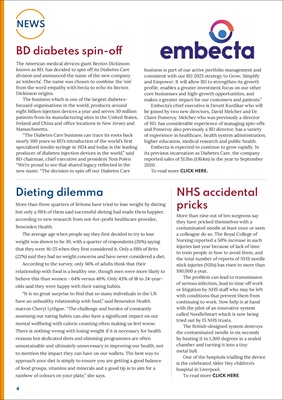
4
NEWS
BD diabetes spin-off
NHS accidental
pricks
More than nine out of ten surgeons say
they have pricked themselves with a
contaminated needle at least once or seen
a colleague do so. The Royal College of
Nursing reported a 50% increase in such
injuries last year because of lack of time
to train people in how to avoid them, and
the total number of reports of NHS needle
stick injuries (NSIs) has risen to more than
100,000 a year.
The problem can lead to transmission
of serious infection, lead to time off work
or litigation by NHS staff who may be left
with conditions that prevent them from
continuing to work. Now help is at hand
with the pilot of an innovative system
called NeedleSmart which is now being
tried out by 15 NHS trusts.
The British-designed system destroys
the contaminated needle in six seconds
by heating it to 1,300 degrees in a sealed
chamber and turning it into a tiny
metal ball.
One of the hospitals trialling the device
is the celebrated Alder Hey children's
hospital in Liverpool.
To read more CLICK HERE.
Dieting dilemma
More than three quarters of Britons have tried to lose weight by dieting
but only a fifth of them said successful dieting had made them happier,
according to new research from not-for-profit healthcare provider,
Benenden Health.
Most people first consider dieting around the age of 30, but one in
four say they were already trying to lose weight when they were aged
16 to 25. Only 22% of 1,000 adults across the UK who were questioned
for the survey claimed they had never considered trying to lose weight.
The average age when people say they first decided to try to lose
weight was shown to be 30, with a quarter of respondents (26%) saying
that they were 16-25 when they first considered it. Only a fifth of Brits
(22%) said they had no weight concerns and have never considered a diet.
According to the survey, only 56% of adults think that their
relationship with food is a healthy one, though men were more likely to
believe this than women - 64% versus 49%. Only 43% of 18 to 24-yearolds said they
were happy with their eating habits.
"It is no great surprise to find that so many individuals in the UK
have an unhealthy relationship with food," said Benenden Health
matron Cheryl Lythgoe. "The challenge and burden of constantly
assessing our eating habits can also have a significant impact on our
mental wellbeing with calorie counting often making us feel worse.
There is nothing wrong with losing weight if it is necessary for health
reasons but dedicated diets and slimming programmes are often
unsustainable and ultimately unnecessary in improving our health, not
to mention the impact they can have on our wallets. The best way to
approach your diet is simply to ensure you are getting a good balance
of food groups, vitamins and minerals and a good tip is to aim for a
rainbow of colours on your plate," she says.
www.pressreleases.responsesource.com
The American medical devices giant Becton Dickinson
known as BD, has decided to spin off its Diabetes Care
division and announced the name of the new company
as 'embecta'. The name was chosen to combine the 'em'
from the word empathy with becta to echo its Becton
Dickinson origins.
The business which is one of the largest diabetesfocused
organisations in the world, produces around
eight billion injection devices a year and serves 30 million
patients from its manufacturing sites in the United States,
Ireland and China and office locations in New Jersey and
Massachusetts.
"The Diabetes Care business can trace its roots back
nearly 100 years to BD's introduction of the world's first
specialized insulin syringe in 1924 and today is the leading
producer of diabetes injection devices in the world," said
BD chairman, chief executive and president Tom Polen
"We're proud to see that shared legacy reflected in the
new name. "The decision to spin off our Diabetes Care
business is part of our active portfolio management and
consistent with our BD 2025 strategy to Grow, Simplify
and Empower. It will allow BD to strengthen its growth
profile, enables a greater investment focus on our other
core businesses and high-growth opportunities, and
makes a greater impact for our customers and patients."
Embecta's chief executive is Devatt Kurdikar who will
be joined by two new directors, David Melcher and Dr.
Claire Pomeroy. Melcher who was previously a director
of BD, has considerable experience of managing spin-offs
and Pomeroy also previously a BD director, has a variety
of experience in healthcare, health system administration,
higher education, medical research and public health.
Embecta is expected to continue to grow rapidly. In
its previous incarnation as Diabetes Care, the company
reported sales of $1.1bn (£814m) in the year to September
2020.
To read more CLICK HERE.